For the average user, smartphones have reached a point where entry level devices are powerful and feature-packed enough to meet the average person’s needs for a personal digital assistant.
Today’s digital lifestyle has gone beyond making simple calls and text messages. It now includes video messaging, web browsing, social media, photography, digital entertainment (music and videos), and gaming.
BUY: ASUS Zenfone 3 Max (Php 8,889) on Lazada
These functions do not require a high-end device.
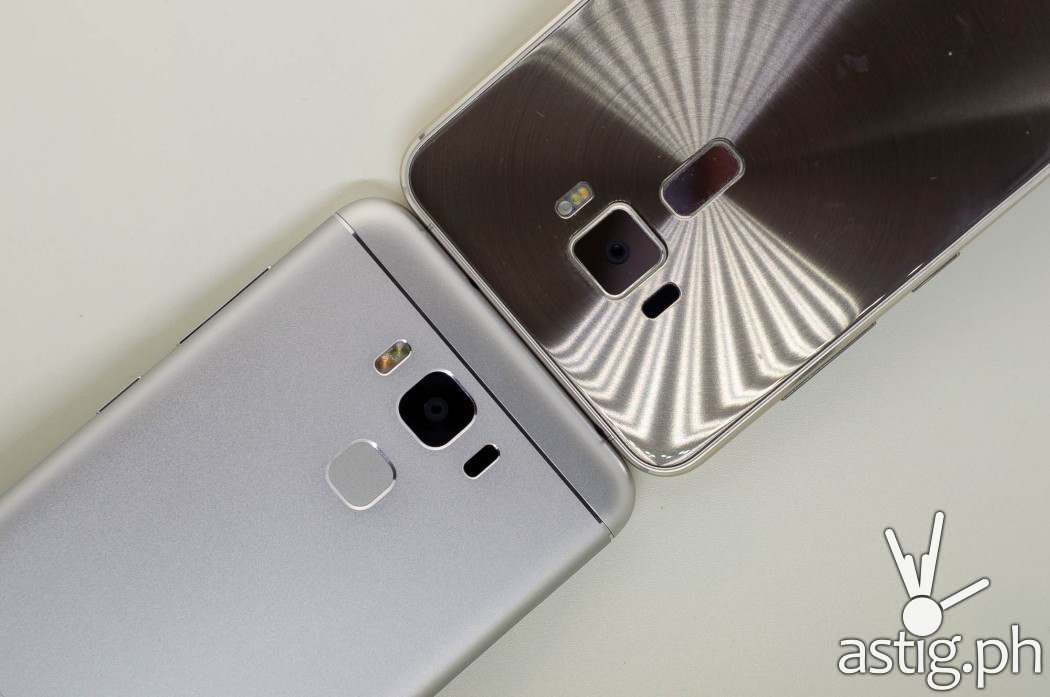
They do, however, take a hit on your phone’s battery – especially when used extensively throughout the day.
For this reason, battery management can be a major concern, especially for heavy users.
What’s the point of owning a powerful device if it’s going to end up dead when you need it? You might as well be carrying a brick.
ASUS Zenfone 3 Max key specs
- All-metal unibody with metallic antenna lines
- Full HD (1920 x 1080) IPS display (5.5-inch variant) or 720p IPS display (5.2-inch variant)
- Dual SIM support (2nd slot shared with MicroSD)
- Android 6.0.1 (Marshmallow) with ZenUI 3.0
- Qualcomm Snapdragon 430 octa-core processor
- 2/3 GB RAM, 16/32 GB ROM
- 13MP rear camera f/2.2 with laser AF and OIS, 1080p video recording
- 4100 mAh non-removable battery
- Fingerprint sensor, Qualcomm Quick Charge 3.0 via USB type-C
With great power comes great battery life
More powerful devices consume more power, and although battery prices have gone lower, the battery life of devices have not gone up.
Of course, hardware and software optimizations help, too. Software bloat takes a hit on performance, especially for Android devices.
Case in point: the iPhone 7 only has 2GB of RAM, yet it remains one of the fastest smartphones we’ve laid our hands on.
Enter the ASUS Zenfone 3 Max, a lower-mid range device with special powers – literally! The Max is equipped with a beastly 4500 mAh battery, allowing it to survive much longer than its competitors.
It runs on the battery-efficient Android 6.0.1, although as with all Zenfones it runs a modded version called the ZenUI.
Thick and built to last
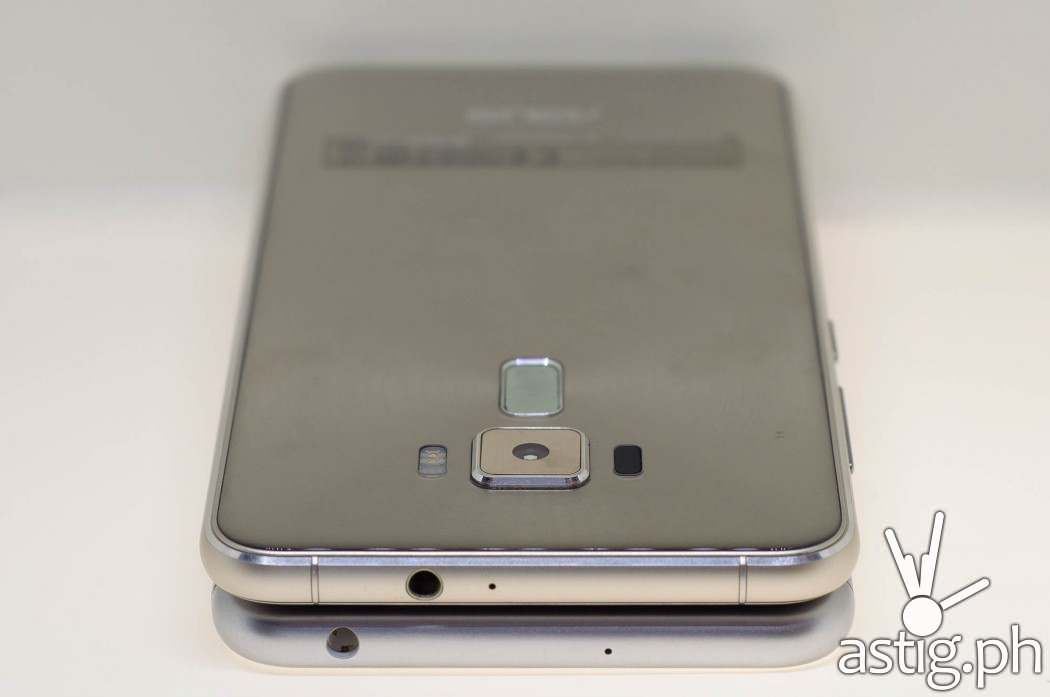
Design wise, the Max follows the ZenFone 3 line, housed in an all-metal unibody with visible antenna lines near the top and bottom edges of its non-removable back cover.
Without a case, the Max is thicker than the average smartphone at 8.6 mm. On paper, it is almost a full millimeter thicker than the Zenfone 3 5.5 or the Zenfone 3 Laser but in reality, the difference is barely noticeable.
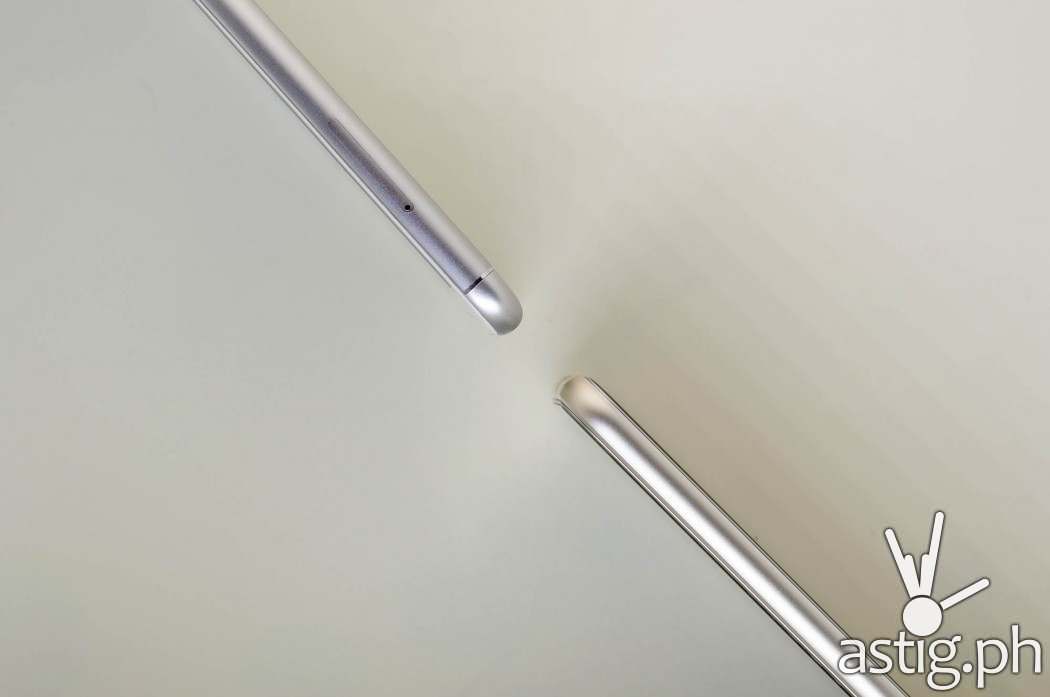
In human terms, the Max is your sexy-fit, toned girl who goes to the gym and can out-run all the sexy-thin girls in the pack.
Dual SIM, laser AF, fingerprint scanner … and a 3.5mm audio port
The rear camera is flanked by a dual LED flash and laser autofocus, with a square fingerprint sensor right below it.
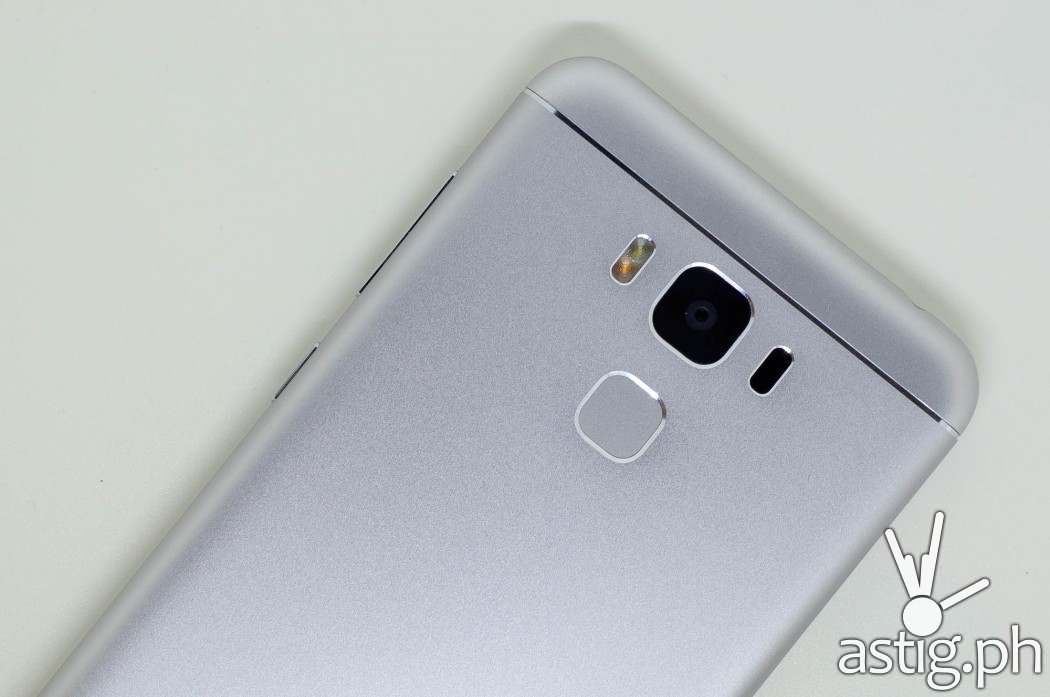
The dual-SIM tray is located on the left side of the device. You will need to use a pin tool to remove the tray, which supports either one micro-sized SIM and one nano-sized SIM or one microSD card and one nano-sized SIM.
We applaud ASUS’ decision to equip the Max with an expandable storage slot that doubles as a SIM card slot. This gives users the freedom of choice while retaining both functionalities.

A 3.5mm audio port can be found at the top portion of the Zenfone 3 Max, while a micro-USB port can be found at the bottom, right beside a single speaker grille.
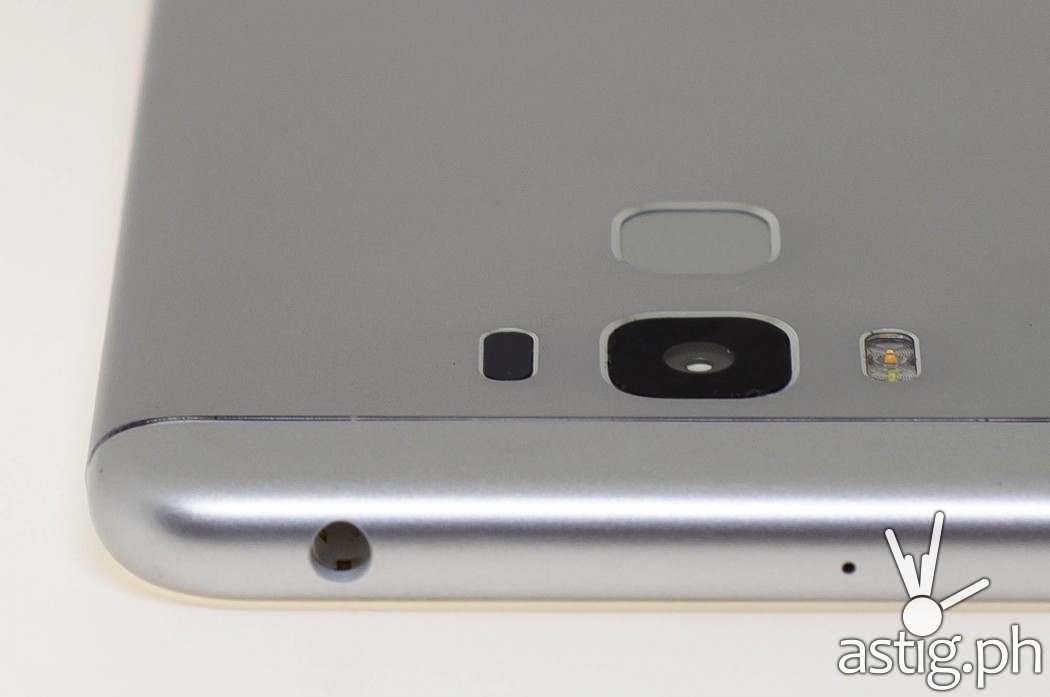
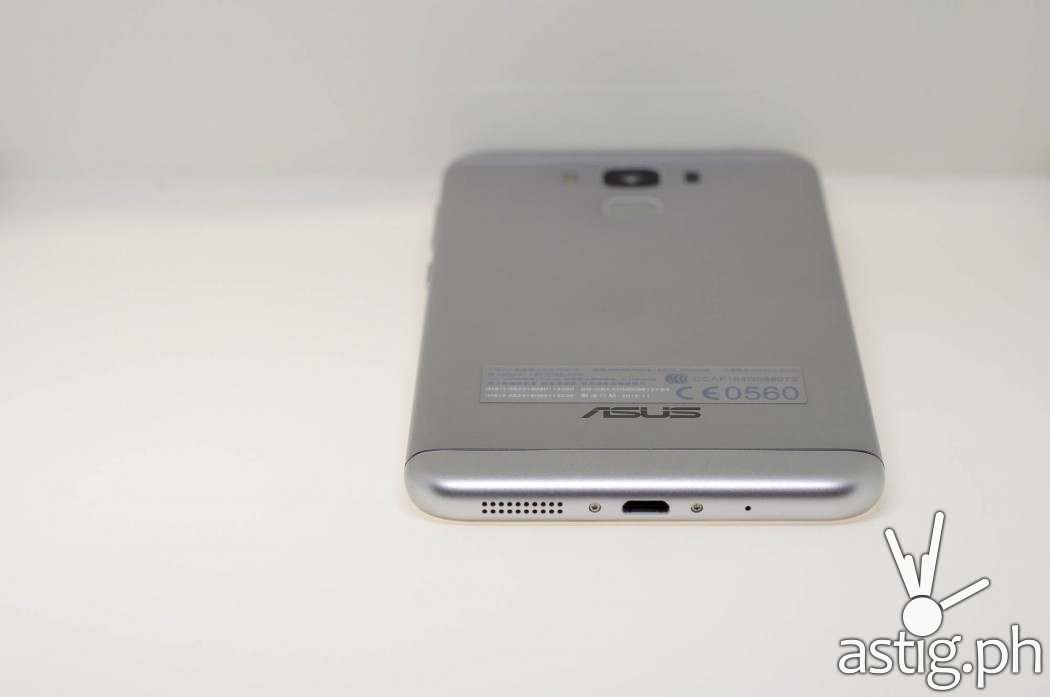
Above the display panel, you will find the earpiece and the front facing camera, while three Android-standard capacitive buttons line the bottom portion of the phone.

All things bright and beautiful, all panels great and small
Speaking display panels, the bigger ZenFone 3 Max (ZC553KL) gets an upgrade over its predecessor, sporting a 5.5-inch 1080p full HD display, while its little brother (ZC520TL) sticks to 720p on its 5.2-inch screen.
Like with other Zenfones, The IPS panel is vivid and bright enough so it stays visible under direct sunlight.

It is so powerful that in dark areas, I have to turn the brightness down or it will end up hurting my eyes.
Did we mention that the antenna lines are metallic? At a time when the iPhone still uses plain white antenna lines, it’s a subtle but very nice touch that shows the ASUS’ attention to detail.
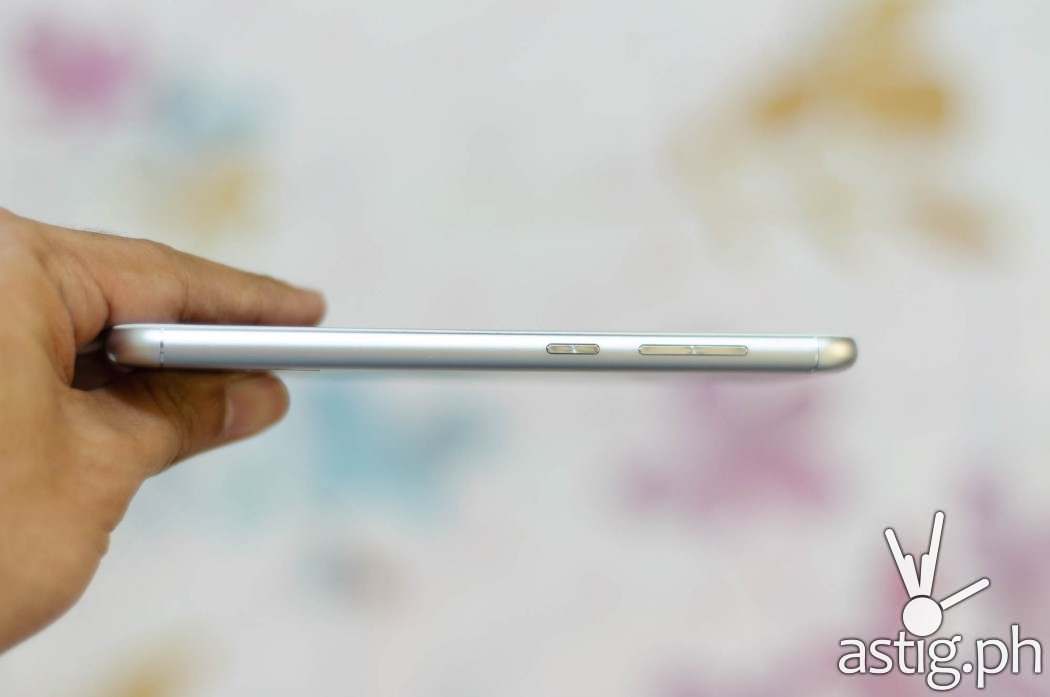
Oh and the 2.5D curved glass that flows smoothly with your hand? Lovely, just lovely.
A phone to last your entire day … GUARANTEED
We are happy to report that the ZenFone 3 Max averages over 12 hours per full charge with 8 hours of screen time – above average for today’s smartphone standards.
GPS, WiFi, and Bluetooth were left on all the time. Mobile data was on at least 50 percent of the time (the remainder being on WiFi).
The USB Type-C port on the Max has a reverse charging capability, so your phone can also function as a backup power bank for your other devices.
Thanks to Qualcomm Quick Charge 3.0 support, charging takes a little over 2 hours with the phone turned off – though thanks to the extremely long battery life this rarely happens as long as you keep your phone topped up by plugging it at night.
We will leave this at that because we are confident with the longevity of the Zenfone 3 Max.
Average camera with real-time HDR but no OIS
Photos taken with the ZenFone 3 Max in well-lit situations look good, however, it struggles under low light situations due to the low aperture size (f/2.2) and lack of OIS.
The dual LED flash helps, but a bigger sensor and optical image stabilization (OIS) would have been better.
Some shots taken with the front-facing camera lack sharpness, even in well-lit situations. The camera can focus really fast thanks to PDAF and laser auto-focus, so the blur could be due to the slow lens and lack of OIS.
Good 3D gaming experience, some UI sluggishness
Zenfone 3 Max runs on Qualcomm’s lower-mid range Snapdragon 430 chipset, so we were not expecting anything too spectacular.
We did find the system to be a little sluggish at times, and there were even a few random crashes which we find very difficult to explain or justify. Take, for example, a fresh install of CPU-Z.
We fired it up and it crashes for no apparent reason – and this is on a system with 3GB of RAM.
Benchmark results are below.
- Antutu: 44115
- PCMark Work 2.0 performance: 3433 (overall)
- PCMark Work 2.0 battery life: 14 hours 12 mins
- PCMark storage score: 3277 (overall)
The Zenfone 3 Max handles 3D games really well, which should be good news heavy gamers.
ASUS Philippines told us that a system update is on the way that addresses performance concerns, so we are looking forward to a vastly improved experience.
Verdict

The ASUS Zenfone 3 Max fills a gap in a market that craves for better battery life while retaining all the basic functions one would ever need in a smartphone.
Excellent product design, dual-SIM capability, and a fingerprint sensor makes the Max a very desirable option for users who are happy with an average performer but want their devices to last longer.
Attractively priced at Php 8889, the Zenfone 3 Max can also be an excellent gift or a secondary phone that can also function as backup energy source for your other, more power hungry devices.
ASUS ZenFone 3 Max 5.5 (ZC520TL) tech specs
- Dimensions: 151.4 x 76.2 x 8.3 mm
- Weight: 175 grams
- Display: 5.5″ 1920 x 1080 IPS LCD
- SIM: Dual-SIM: Micro-SIM + Nano-SIM (swap with MicroSD)
- OS: Android M + ZenUI 3.0
- Chipset: Qualcomm MSM8937 Snapdragon 430
- CPU: Octa-core 64-bit processor, 1.4GHz Cortex-A53
- GPU: Adreno 505
- Memory: 3GB RAM, 32GB ROM
- Expansion: Up to 256GB MicroSD (uses Nano-SIM slot)
- Front Camera: 8MP f/2.2
- Rear Camera: 16 MP, f/2.0, phase detection & laser autofocus, dual-LED (dual tone) flash
- GPS: AGPS, GLONASS, BDS
- Battery: 4100 mAh non-removable
- Colors: Titanium Gray, Glacier Silver, Rose Pink, Sand Gold
- Fingerprint sensor: Yes
- Accelerometer: Yes
- Price: Php 8,995
ASUS ZenFone 3 Max 5.2 (ZC520TL) tech specs
- Dimensions: 149.5 x 73.7 x 8.55 mm
- Weight: 148 grams
- Display: 5.2″ 1280 x 720
- SIM: Dual-SIM: Micro-SIM + Nano-SIM (swap with MicroSD)
- OS: Android M + ZenUI 3.0
- CPU: Quad-core 64-bit processor, 1.25GHz
- GPU: Mali T720
- Memory: 3GB RAM, 32GB ROM
- Expansion: Up to 64GB MicroSD (uses Nano-SIM slot)
- Front Camera: 5MP f/2.0
- Rear Camera: 13MP
- GPS: GPS, AGPS, GLONESS, BEIDOU
- Battery: 4130 mAh non-removable
- Colors: Titanium Gray, Glacier Silver, Sand Gold
- Fingerprint sensor: Yes
- Accelerometer: Yes

